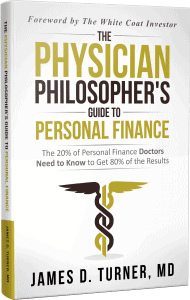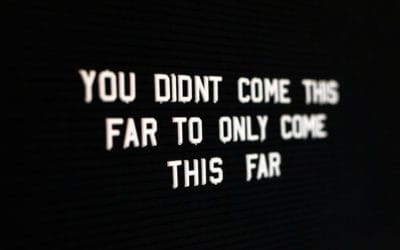In the 70s, the aviation industry had a culture problem. The pilot was an autocratic and authoritative figure, often viewed like God. What the pilot said was the law, and it was not to be questioned. Unfortunately, this problem often led to airline accidents. In March of 1977, two 747’s collided on a runway. The accident would kill 583 people on the island of Tenerife. All because of a culture problem caused by a captain trying to avoid a duty-hours violation.
After this tragic loss, the aviation industry would be forever changed. Investigators realized that the culture must be improved. Systematic solutions (e.g. Crew Resource Management) would need to be installed. These changes are what make flying safe today.
It is time for medicine to learn many of these same lessons. The culture must change, but until it does we must also utilize the only escape hatch we often have – Financial Independence.
Medicine’s Culture Problem
I was previously interviewed on the White Coat Investor podcast, and Jim asked me a couple of questions that got me thinking. First, he asked if burnout is caused by systematic or individual problems (i.e. is the system burning doctors out or are doctors experiencing burnout because they aren’t resilient enough).
I explained that I thought physician burnout was unequivocally a systematic problem. Some like the better term moral injury, though that hasn’t quite made it into colloquial language yet. Regardless, victim-blaming the burned-out doctor is not the answer.
Surveys show that there are many causes to burnout, but they have a common theme – doctors are losing autonomy.
They have lost the autonomy to treat patients. Insurance companies fight back and steal that right. Physicians no longer have autonomy over their time. Administrators have stolen the schedule as they demand we cram patients into 10-15 minute visits. Doctors have lost the autonomy to document their medical care. Instead, we now have electronic medical records, which are really just glorified billing machines masquerading as “patient care” tools.
Of course, there are other problems, too. Physicians feel undervalued, and over worked. We are starting to learn that the hospital will not love us back.
All of this has led to epidemic rates of burnout where 40-50% of physicians are experiencing the fall out. And this doesn’t even touch the physician suicide problem we also have.
Systematic Problems Require Systematic Solutions
Burnout is not an individual problem. It is caused by a broken system.
Yet, most of the currently proposed solutions do not address the system. Actually, the “solutions” suggest that the problem is caused by doctors who are not resilient enough. We are told to meditate/pray, practice mindfulness, seek resilience training, and to go to counseling.
While these techniques may provide some benefit, they are not the solution. Changing the system would be complicated, but its the only solution that will actually work.
In fact, this is why ZDoggMD says that “burnout” is not the right term. Instead, he says that we should use the term “moral injury” (here is a powerful video where he explains the moral injury concept). Moral injury avoids the victim shaming. It implies that the system injured the doctor. The doctor did not injure themselves.
While he is right, this is a systematic problem that requires systematic solutions… we can’t wait for the system to fix itself.
This is why the physician burnout problem requires an escape hatch.
FIRE is NOT the Answer
I mentioned above that Jim asked me a couple of interesting questions in the WCI podcast interview. The follow-up question (to whether burnout is a systematic or individual problem) was whether FIRE was the solution to the problem.
I answered Jim with an emphatic, “No”. You may have noticed that I rarely talk about early retirement on this blog. And that is unlikely to change.
While I have no problem with physicians who retire early (in fact, I’ve been known to defend doctors who want to retire early), as a young academic anesthesiologist it is not my goal to deplete our country of its doctors. I want to free them to practice medicine because they want to, and not because they have to.
FIRE is not the best solution; particularly, early in your career. Regardless of how big of a saver you are, FIRE is 10-12 years away for early career doctors facing burnout. Focusing on this might cause more problems than solutions.
[Those who don’t venture very far into the physician finance space may not know that FIRE is an acronym that stands for Financial Independence Retire Early. If you are looking for THE leader in this space, I recommend starting with this post on Physician on FIRE.]
Financial Independence is an Escape Hatch
While FIRE may not be the answer, a focus on financial independence (FI) can often provide the escape hatch we are looking for. It is our way out from this crashing and burning plane that is medicine.
 As we approach the point where we are no longer dependent on our paycheck, we find freedom.
As we approach the point where we are no longer dependent on our paycheck, we find freedom.
It provides the freedom to speak up. To fix this moral injury problem we have on our hands. We no longer have to worry about losing our jobs or the ramifications of standing up for the right thing. [I find it sad that I need to say that freedom allows us “to do the right thing,” but it’s true].
Imagine a world where we feel empowered to say, “Enough is enough!” Where we say “no” to 10-15 minute patient visits. No to those RVU goals, publication expectations, and the need to make the bean counters happy.
What if you could spend as much (or as little) time at work as you wanted. What if we instituted a Hell Yes policy where we said no to everything unless it made us say “Hell, yes!”
Ever dream of having a three or four day weekend every week? That’s possible with financial independence. You want to work one week per month doing mission work while you travel the other three weeks?
Financial Independence makes this all possible.
Take Home
The collision of two planes on Tenerife led to big changes in the airline industry. I’d like to say that it won’t take as devestating of an outcome to fix medicine, but that just doesn’t seem true.
In a field where women physicians are 130% more likely to commit suicide (and male physicians are 40% more likely) than the general public, we already have a big problem on our hands. Our plane is currently crashing to the ground. It’s just that the “powers that be” are not noticing.
This is why we must take matters into our own hands.
Today is the day for you to fight burnout with financial independence. Create a plan, and get on a path that will allow you to practice medicine because you want to. Not because you have to.
What do you think? Is burnout a systematic or individual problem? Is FIRE a reliable solution? Leave a comment.
TPP





I truly believe it is 100% a systemic problem as well. To try and turn it on individuals as the reason why burnout is increasing is ludicrous.
I have decreased my clinical workload by paying for a semi-retired radiology doc to cover me 1 day a week. I would not have felt comfortable doing so if I was not FI and especially if I was not debt-free.
I have shown before that because of the progressive tax code, the amount of money I spend for this coverage is actually far less than the actual rate (if I had worked that day and saved that fee, that money would be hit with general overhead as well as taxed at my highest marginal rate (37%)).
I am on the RE course myself because I just don’t see medicine improving in the near future and even working only 4 days a week has not completely eliminated the feeling of burnout when I do work.
I agree that the more we work, the less incentive we have. Cutting back as a high-income earning physician makes so much sense a lot of the time.
FIRE IS one answer. Maybe not the RE part, but that is your point.
The FI part, even during the journey, is all about life optimization. In every aspect of life, make small improvements that compound over time.
I love the “Hell Yes Policy.” Lately I have focused on what to stop doing (as in the Pareto principal — stop doing the 20% of things that cause 80% of your headaches) but an opt-in policy — saying yes to the 20% of things that bring you 80% of the pleasure — Hell Yes — is a great addition!
I love it! Applying the Pareto Principle to burnout is certainly something that I can get behind.
I have debated this point with Jim on the forum, in his blog, etc. Financial independence is not THE answer, but it is part of the equation. Sure, if you have enough money, you can just walk away, but many are burning out long before that is possible.
Many times, the answer is to take the lower paying job, which many docs are loath to do, especially when burdened with large student loan balances. Not always, but often the lower paying job pays less because they are not working you like a rented mule. It might have better culture, better mentors, more support people, etc. Unlike the compensation package, these intangibles are difficult to gauge when you are seeking a job, especially early in your career.
Completely agree on all counts, Vagabond. Cutting back and taking the lower paying job often equates with more contentment and less rat races.
Being on a path to FI provides a ton of freedom to do just that. I’ll probably cut back in the not too distant future myself.
I agree FI does provide leverage. It is not as easy to leave a job one hates these days. Debt, Family ties, Restrictive covenants, and the resistance to believe the grass is greener on the other side provide obstacles to getting out. Then what are the options? The system has to change.
How do we select the meds students? What do we teach them about life, money, debt, burnout. My med school was progressive in the 70’s and spent a fair amount of time dealing with psychosocial things. I hated it. I thought it was boring. I didn’t put forth that much effort into it. I thought I needed to spend my time learning science stuff. It turns that I did get something out of the “non science courses” Thank God. That was actually more important than the science stuff. What has happened in the last decade in medicine is sad. I hope things change. Thanks for continuing to talk about the subject.
It’s amazing what a little bit of perspective will do for you. Glad that you had that “boring” stuff taught to you back then! Trying to do the same for my residents today (and make it less “boring” while doing it).
FIRE is definitely not the answer. But being FI definitely helps.
The truth is… not all health care systems are created equally. Some are less punishing than others. Some systems create better working environments.
The fact of the matter is that doctors should never feel stuck. I think no matter where a doctor is in their financial journey, they should have the confidence to get out of an unhappy/unfulfilled/burnedout situation, course correct, and find a better job that suits their needs. Being FI certainly does empower a physician even more though.
You are right, DMF. I’ll have to admit that I struggle with that “confidence to get out” part. I love my job for the most part, though. But I do wonder at times if I would have the courage to change things at my main gig if it came down to it.
I’m going to build on what Vagabond stated – FI is a variable in the equation whose value grows as net worth increases. If you play your cards right, the FI variable begins to dwarf all other sums in the equation, to the point where issues like accepting aggravations (call, nights) or working at someone else’s convenience and on their schedule rather than yours become far smaller considerations in your career.
As a result, you can cut back and what’s left is the job you envisioned taking on those many years ago – time to connect with human beings at a vulnerable moment, mastery of skills like healing instead of skills like billing, restoring the patient’s health without jeopardizing your own health.
So by focusing on FI you earn your way toward cutting out the worst aspects of medicine, while simultaneously course-correcting into the career you thought you were pursuing all along.
Yeah, that would be ideal (the part about finding the career you really want through FI). Ultimately, I want to he a really good doctor, but I also want to be a really good husband and father and man of faith. Finding that balance is tough at 1.3 FTE. Even in the small battles I’ve won to cut back even a little now have done great things towards finding that balance.
I really like Crispy Doc’s comment of “correcting into the career you thought you were pursuing all along.” This statement describes what I’ve instinctively been trying to accomplish the last five or six years since I realized I was FI. I was able to negotiate some positive changes and exchanged some income for freedom. The changes made the job much better and I don’t want to contemplate early retirement now. I never even thought to try to make these changes before I became FI.
Crispy Doc is full of wisdom! And this is likely a route I’ll follow, too!
Another vote for crispy doc — I find as a midcareer doc who has been FI for a while, that by just cutting back to 80%, of which part is home telemedicine, the stress reduction is great enough that I can accept the usual aggravations and even the occasional inappropriately irate patient as if I had a Teflon coat. Part of this is just being older and aware of my limitations. However, it does seem I can appreciate and savor better why I decided to practice medicine, which is the point.